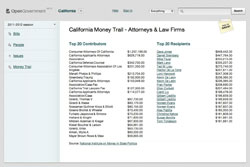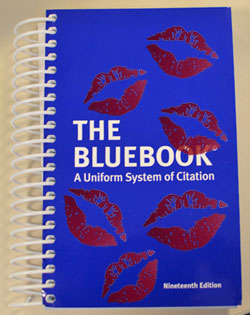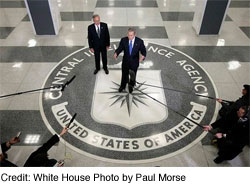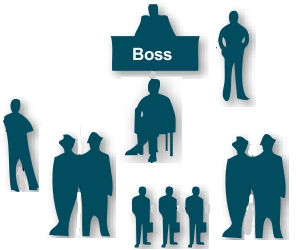 Last month, while researching a post on the politics and money site, MapLight.org, I came across another interesting online resource: OpenGovernment.org. The site is still very much in beta, but after having had a chance to check it out a little bit more this weekend, I thought it worth mentioning here to our readers.
Last month, while researching a post on the politics and money site, MapLight.org, I came across another interesting online resource: OpenGovernment.org. The site is still very much in beta, but after having had a chance to check it out a little bit more this weekend, I thought it worth mentioning here to our readers.
The goal of OpenGovernment, supported in part by the great folks who run OpenCongress.org, is to provide and promote government transparency on the state, city and local levels. Still in its infancy, the site has launched and tracks the following states: California, Louisiana, Maryland, Texas, and Wisconsin. Given that Justia is based in the Golden State, I decided to take a look at what resources and information are available for California. Similar to the tools available at OpenCongress, OpenGovernment enables users to drill down and learn more about what’s happening in Sacramento by looking at individual bills, following specific legislators in the Senate and Assembly, or browsing by issue. In addition, the site has its own “Money Trail” which lists publicly-available information about campaign contributions made to members of the California state legislature. As examples, check out Big Tobacco, Telecommunications and Casinos and Racetracks. You can also look up your representatives by entering a ZIP code or an address, and one hopes in the future that we’ll also see a mash up geo-tracking feature that displays bills which specifically impact where one lives, similar to the feature found on govpulse.
 The Supreme Court has handed down opinions in some of the cases that we blogged about back in October. Here are the updates.
The Supreme Court has handed down opinions in some of the cases that we blogged about back in October. Here are the updates.
 Last month, the
Last month, the 
 Have you heard that
Have you heard that 



 Like death and taxes, organized crime appears to be an unavoidable part of life around the world. Today’s
Like death and taxes, organized crime appears to be an unavoidable part of life around the world. Today’s  One of the perks of working at Justia is that our office is just a few doors down from a Starbucks. Chances are on any given day you’ll find a steady stream of Justians popping over at some point to re-fuel on caffeine and load up on something to eat. Imagine how surprised a group of us were last week then to see that the coffee chain now posts the
One of the perks of working at Justia is that our office is just a few doors down from a Starbucks. Chances are on any given day you’ll find a steady stream of Justians popping over at some point to re-fuel on caffeine and load up on something to eat. Imagine how surprised a group of us were last week then to see that the coffee chain now posts the